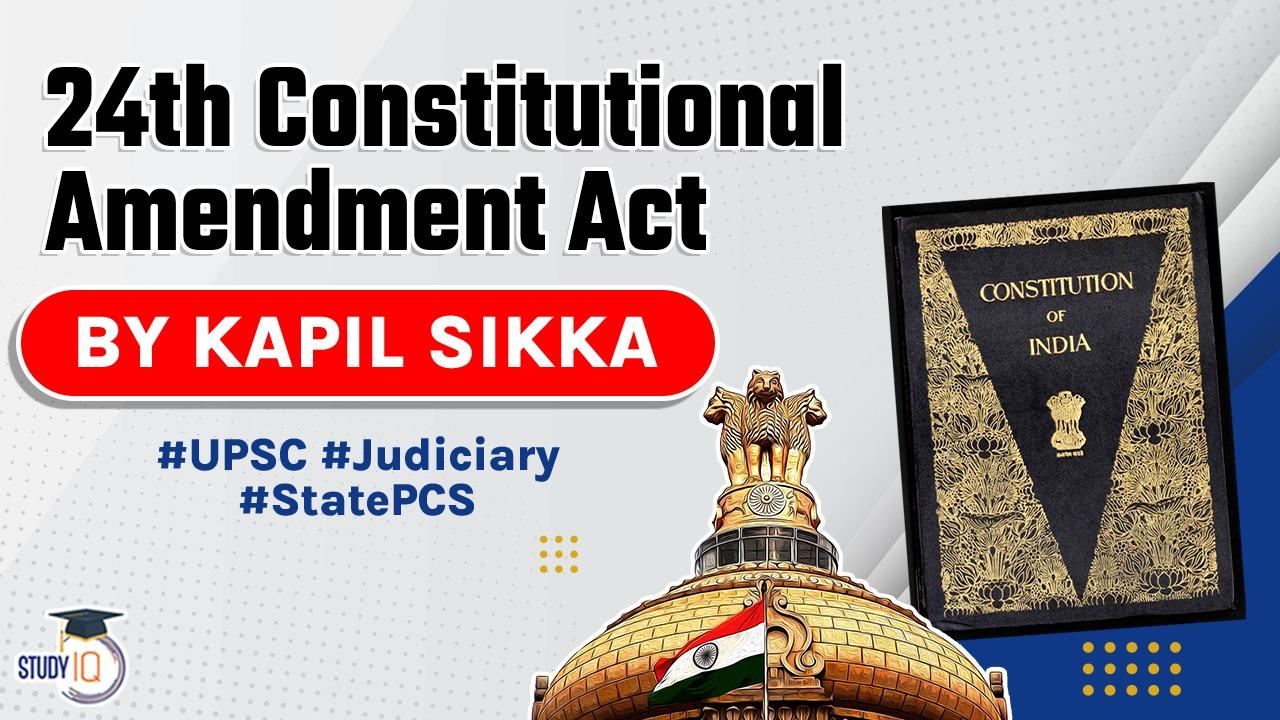Table of Contents
STATEMENT OF OBJECTS AND REASONS

- The Supreme Court in the well-known Golak Nath’s case [1967, 2 S.C.R. 762] reversed, by a narrow majority, its own earlier decisions upholding the power of Parliament to amend all parts of the Constitution including Part III relating to fundamental rights.
- The result of the judgment is that Parliament is considered to have no power to take away or curtail any of the fundamental rights guaranteed by Part III of the Constitution even if it becomes necessary to do so for giving effect to the Directive Principles of State Policy and for the attainment of the objectives set out in the Preamble to the Constitution.
- It is, therefore, considered necessary to provide expressly that Parliament has power to amend any provision of the Constitution so as to include the provisions of Part III within the scope of the amending power.
Golaknath Vs State of Punjab 1967
- Surplus Land of Golaknath family was taken away by state under Punjab security and Land Tenures Act
- The petitioner argued that the constitution of India was drafted by the constituent assembly and it is of permanent nature.
- No one can change or can try to bring change in the constitution of India.
- They argued that the word “amendment” in question only implies a change in accordance with the basic structure but not altogether a new idea.
- Further, the petitioner contended that the fundamental rights enshrined under part III of the constitution cannot be taken away by the parliament. (U/A 19(1)(f)
- They are the essential and integral part of the constitution without which constitution is like a body without a soul.
- The petitioner also argued that Article 368 of our constitution only defines the procedure for amending the constitution.
- It does not give the power to the parliament to amend the constitution.
- They sought to have the seventeenth amendment – which had placed the Punjab Act in ninth schedule – declared ultra vires (beyond the powers)
Golak Nath effect and 24th Constitutional Amendment Act
- In Golak Nath, Subba Rao CJ (Chief Justice) said that Art. 368 only provided “procedure to amend the constitution” only and not the “power” to amend. (Prior to 1971, Art. 368 had a marginal note “procedure to amend” only.
- Due to the difficulties created in Golak Nath, the Parliament passed the 24th amendment Act in 1971 and made significant changes to Art. 368 and Art. 13 and nullified the Golak Nath effect!
In Response to it, Parliament
- The 24th Amendment Act, 1971 amended Articles 13 and 368.
- It declared that the Parliament has the power to abridge or take away any of the Fundamental Rights under Article 368 and such an Act, will not be a law under the meaning of Article 13.
- Also, Made it compulsory for the President to give his assent to a Constitutional Amendment Bill.
- The 25th Amendment Act, 1972, Restricted property rights and compensation in case the state takes over private property
Amendments Done
- 2. Amendment of article 13.-In article 13 of the Constitution, after clause (3), the following clause shall be inserted, namely:–
“(4) Nothing in this article shall apply to any amendment of this Constitution made under article 368.”.
- Heading of A-368
- “Power of Parliament to amend the Constitution and procedure therefor.”;
Constitutional Amendment Bills
- “it shall be presented to the President for his assent and upon such assent being given to the Bill”,
- the words “it shall be presented to the President who shall give his assent to the Bill and thereupon” shall be substituted;
- (d) after clause (2) as so re-numbered, the following clause shall be inserted, namely:-
- “(3) Nothing in article 13 shall apply to any amendment made under this article.”.






















 WhatsApp
WhatsApp